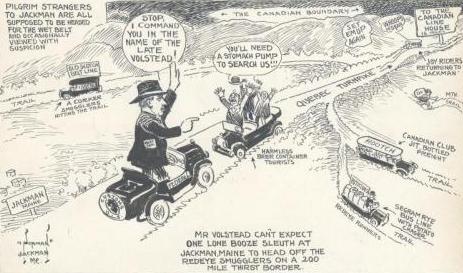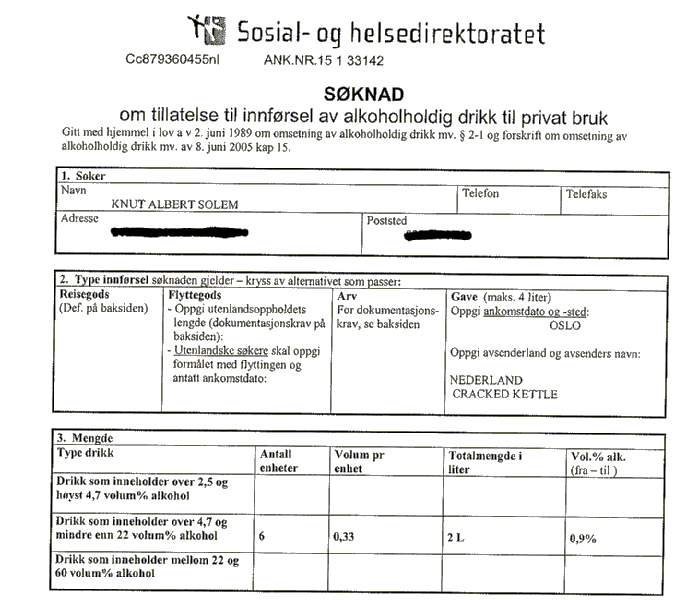[This post was written by Blork…]
The workers of the liquor stores in Quebec are on strike. In any other place in Canada that would cause a small crisis, but Quebec is distinct in Canada for several reasons, one of which is the retail sales of beer and wine. While spirits can only be purchased at the government-run retail stores (the Société des alcools du Québec, or SAQ) beer and wine can be purchased at any grocery store or dépanneur (convenience store).
To my knowledge, the only other place in Canada where you can buy beer in convenience stores is Newfoundland. In that case it is only selected stores (I think) and you have to buy a “package.” Here in Quebec, beer and wine is available in every dépanneur, and you can buy individual bottles, not just packages.
Unfortunately, the selection of beers and wines at most dépanneurs is not great. In the case of wines, there is a clear distinction between the wines of a dépanneur and the wines of the SAQ. Essentially, wines that are shipped to Quebec in bulk to be bottled locally are sold in dépanneurs. Most are quite bad, although some — notably the ones from Chile — are serviceable as table wines. “Real” wines are only available at the SAQ.
As for beers, most dépanneurs handle the usual array of standard domestics — Labatt and Molson products, perhaps some Sleeman’s, and a few others. Most dépanneurs have a few “imports” which are invariably Grolsh, Heineken, and Corona. Dépanneurs in urban areas usually carry a selection of Quebec-made microbrews (usually from Brasseur du Nord and McAuslan), but the farther you get into the countryside the fewer you see of these — unless you find yourself in an enclave of urbanites in exile.
This system has the immediate benefit of having wine and cold beer available within walking distance of any home until 11:00 pm seven days a week. However, it is not without pitfalls. For example, the dépanneur wines are not only of lower quality than SAQ wines, but they seem, quite naturally, to be less expensive. Not necessarily, however, given that SAQ prices include all taxes and dépanneur prices do not include 15% sales tax. Most dépanneur wines are priced between $8 and $12 before tax, which I find outrageous. It is still possible to find a quite drinkable wine at the SAQ for under $11. Some dépanneurs — such as ones that are far from any SAQ outlet — gouge the consumer by cranking the prices even higher. I once was asked for $17 (after taxes) for a bottle of wine that usually retailed for about $10 (and was worth half of that in terms of quality).
In terms of beer, the SAQ handles an interesting — but not exhaustive — array of imported beers, and does not carry domestics. Thus, if you want to try something interesting from elsewhere, the SAQ is usually your only choice (but not always — more on that in another post). However, you can imagine my surprise when I found cans of Japanese Sapporo beer in my neighbourhood grocery store last week, stacked next to jars of mustard and cans of tomatoes. Sapporo is quite well known, and easy to find, but I have not had it for some time, so I bought one — partially because I’m rather fond of the heavy aluminum can in which it comes.
I cracked it open last night over a dinner of guacamole, artisanal tortilla chips, and home-made chili. It was much as I remembered it — a good sturdy lager with a nice lacy head and golden color. Sort of a summery beer, but robust enough to stand up to my beefy meal. Then I looked closely at the can and was shocked to see that it was made in Ontario by Sleeman’s, under license from Sapporo! Quel shock!
And there lies another pitfall of dépanneur shopping. A quick visit to the SAQ’s Web site revealed that “real” Sapporo from Japan is available in some SAQ stores. Those who like the convenience of dépanneurs, however, must bear with the imitations.
Since both are available, perhaps I should set up a taste test…



 On the outskirts of Europe there lives a peculiar tribe of people. Like most other nations, they feel that they have the solution to every problem on the planet. Other small nations have had to bow to the necessity of adjusting to their surroundings, but Norway had the curse to find oil and gas in the 1970s, giving them the possibility of constructing their own reality.
On the outskirts of Europe there lives a peculiar tribe of people. Like most other nations, they feel that they have the solution to every problem on the planet. Other small nations have had to bow to the necessity of adjusting to their surroundings, but Norway had the curse to find oil and gas in the 1970s, giving them the possibility of constructing their own reality. I am greatly saddened by the whole soccer head scarf debate surrounding one girl who wants to play. Playing is good and as we learn over and over FIFA is bad. It is not a difficult or even controversial statement. It is simply so. Feel good about thinking FIFA bad. Does anyone shed a tear for the Olympic Committee or any other private unelected mens’ clubs that organize sport to rake in personal privilege and benefit? It is only right and good to lump FIFA in and, frankly, place them up at the top of the lump.
I am greatly saddened by the whole soccer head scarf debate surrounding one girl who wants to play. Playing is good and as we learn over and over FIFA is bad. It is not a difficult or even controversial statement. It is simply so. Feel good about thinking FIFA bad. Does anyone shed a tear for the Olympic Committee or any other private unelected mens’ clubs that organize sport to rake in personal privilege and benefit? It is only right and good to lump FIFA in and, frankly, place them up at the top of the lump. Big news from a little place
Big news from a little place